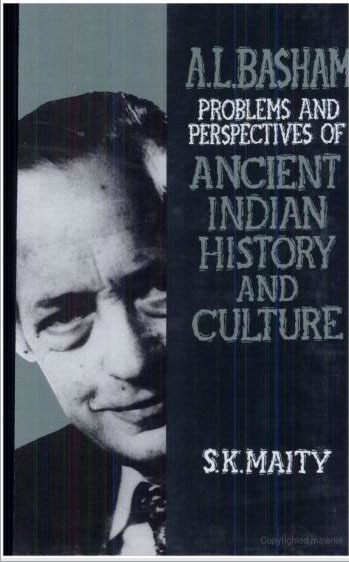- Arthur Llewellyn Basham
Infobox Person
name = Arthur Llewellyn Basham

image_size = 200px
caption =
birth_name =
birth_date = birth date|1914|05|24|df=y
birth_place =Loughton ,Essex ,England
death_date = death date and age|1986|01|27|1914|05|24|df=y
death_place =Calcutta ,India
death_cause =
resting_place =
resting_place_coordinates =
residence =
nationality = British
other_names =
known_for = noted historian andindologist
education =School of Oriental and African Studies
employer =
occupation = Historian and Educationalist
title =
salary =
networth =
height =
weight =
term =
predecessor =
successor =
party =
boards =
religion =
spouse =
partner =
children = 1 (1 daughter)
parents =
relatives =
website =
footnotes = Professor Arthur Llewellyn Basham (24 May 1914—27 January 1986) was a noted historian andindologist and author of a number of books.Early life
Arthur Llewellyn Basham was born on May 24, 1914, in
Loughton ,Essex , the son of Abraham Arthur Edward Basham and Maria Jane Basham née Thompson. Although an only child, he grew up in Essex with his adopted sister, who was in fact his cousin on his father's side. His father had been a journalist who served in the Indian Army atKasauli , nearSimla duringWorld War 1 , and it was the stories that his father told him aboutIndia that first introduced him to the culture of the country he would devote his professional career to. [Sachindra Kumar Maity, "Professor A.L. Basham, My Guruji and Problems and Perspectives of Ancient Indian History and Culture", page 3, 1997, (Abhinav Publications: India)] His mother was also a journalist and short story writer further instilling a love of language and literature. As a child, he was also introduced to music and learnt to play the piano to a high standard, writing a number of his own compositions by the age of sixteen.Basham developed a keen interest in religion which began with the
Christianity he was brought up with and then extended intoHinduism ,Buddhism andIslam . He went on to take a BA inSanskrit from theSchool of Oriental and African Studies ("SOAS") and then worked in the Civil Defence Department duringWorld War 2 . [Sachindra Kumar Maity, "Professor A.L. Basham, My Guruji and Problems and Perspectives of Ancient Indian History and Culture", page 4, 1997, (Abhinav Publications: India)] .Career
After the war he returned to
SOAS and began researching for aPh.D under Professor L.D.Barnett. For his research into the "History and Doctrines of the Ajivikas" he received a scholarship. He became a lecturer in 1948, attained the Ph.D in 1950, became aReader in 1954, and in 1958 was promoted toProfessorship . When the Head of the Department of History, ProfessorC. H. Philips , was promoted to the Directorship of SOAS, Professor Basham became the Head of History, a position he kept until 1965 when he joined theAustralian National University ("ANU") inCanberra as Head of the History Department and Professor ofOriental (later Asian) Civilizations. [Sachindra Kumar Maity, "Professor A.L. Basham, My Guruji and Problems and Perspectives of Ancient Indian History and Culture", page 4, 1997, (Abhinav Publications: India)]After retiring from ANU in 1979, Basham accepted a series of one year visiting professorships with various universities. Basham was one of the first western historians to critically gauge the impact of
Swami Vivekananda from a global perspecive. His well-known comment about Vivekananda that "in centuries to come, he will be remembered as one of the main moulders of the modern world," is quoted frequently in appreciations and tributes of Vivekananda. Basham was appointed Swami Vivekananda Professor in Oriental Studies at the Asiatic Society of Calcutta in September 1985. He died inCalcutta inIndia in 1986. An annual public lecture series is given at the ANU in his memory.Books
Possibly his most popular book is "
The Wonder That was India " (Sidgwick & Jackson, London, 1954) - published seven years after the 1947 Independence of India. Revised editions of the book were released in 1963 and then 1967. Rupa & Co, New Delhi brought out a paperback edition in 1981. Macmillan Publishers Ltd., London, brought out a paperback edition in 1985. By 2001, the paperback version was in its 37th edition. Amazon.com staff review/book description reads "most widely used introduction to Indian civilization. Although first published in 1954, it has remained a classic interpretation."Basham also wrote "History and Doctrines of the Ajivikas", based on his PhD work done under L. D. Barnett. He also wrote "The Origins and Development of Classical Hinduism" jointly with Kenneth G. Zysk. A book about Basham, written by Sachindra Kumar Maity (published 1997, Abhinav Publications, ISBN 8170173264) is entitled Professor A.L. Basham, My Guruji and Problems and Perspectives of Ancient Indian History and Culture. the book includes 80 of Basham's letters addressed to the author.
Thomas R. Trautmann a professor for history and anthropology of the Michigan University, dedicated his book "Aryans and British India" (1997, University of California Press) 'In memory of A. L. Basham, British Sanskritist historian of India, guru, friend'.References
External links
* [http://asianstudies.anu.edu.au/wiki/index.php/Basham_Lectures Basham lectures at the Australian National University]
* [http://www.kamat.com/jyotsna/blog/basham.htm When I met A.L. Basham by Jyotsna Kamat]* Amazon.com - [http://www.amazon.com/dp/0404202039/]
Wikimedia Foundation. 2010.
